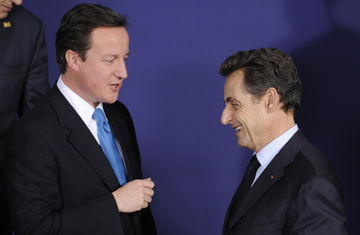
French President Nicolas Sarkozy (right) talks with British Prime Minister David Cameron before a family photo of the E.U. summit on December 16, 2010 at the European Council headquarters in Brussels
European leaders mulling military intervention in Libya have doubtless been warned that there are huge hurdles to any action, not least winning a United Nations mandate, ensuring U.S. involvement, and securing support from key Arab and African allies in the region. But are they overlooking another obstacle in the form of defense cuts? With European governments striving to balance their budgets, including defense expenditure, questions are being raised about whether such money-saving measures could jeopardize their ability to launch operations in Libya.
The issue has recently come up in Britain, where Prime Minister David Cameron announced on Feb. 28 that he was talking with allies about using fighter jets to impose a no-fly zone over Libya, patrolling and shooting down Libyan aircraft ordered to attack protesters. But Cameron's bold offer to lead military action against Colonel Gaddafi was undercut the very next day when his own government announced that 11,000 soldiers, sailors and airmen would be laid off in an effort to tackle the defense ministry's $50 billion debt mountain. Even the government's allies in the media were stunned by this juxtaposition of bellicose rhetoric with the mundane reality of budget constraints. "It is hard to imagine a more crass and cack-handed display at a time of international uncertainty," thundered the Daily Telegraph, a traditionally loyal supporter of Cameron's Conservative Party.
Britain is not alone in making cuts to its armed forces: across Europe, governments have been looking for savings in military expenditure. Germany's Ministry of Defense, for example, is planning to cut $11 billion from its budget in the next four years, along with reducing personnel by nearly 40% and closing down a large number of military facilities.
But the economic downturn only partly explains the budget cuts, as European governments have been streamlining their armed forces ever since the end of the Cold War. "Most European defense establishments have been overloaded, mistakenly procured and focus on Cold War scenarios," says Daniel Korski, a senior fellow at the European Council on Foreign Relations. "To say that defense cuts will jeopardize any intervention in Libya suggests that everything was fine in the first place."
Overhauling armed forces doesn't necessarily mean making them weaker, says Scott A. Harris, Continental Europe President of U.S. defense contractor Lockheed Martin: "It's about efficiency. Armed forces can be smaller, but they must be highly trained for a variety of scenarios so that they are mobile, agile and adaptable. If done smartly, budgets can be cut without reducing capabilities." And European governments are also using defense reforms as an opportunity to pool and share: the European Defense Agency, set up in 2004, has helped several member-states upgrade their helicopters so that they can take part in operations in Afghanistan, while last November Cameron and French President Nicolas Sarkozy announced a number of Franco-British defense initiatives including the shared use of aircraft carriers.
But despite these reforms, European armies still lack the means to operate in difficult theaters. Clara Marina O'Donnell, a research fellow at the Centre for European Reform, says European defense capabilities have actually been diminished since they took part in NATO's 1995 bombing campaign in Bosnia. "Europeans would be not be prepared for any intervention in Libya now. They cannot deliver on action. In fact, Europe could [probably] not do Bosnia again," she says.
And besides, says Daniel Keohane, defense expert at the Paris-based European Union Institute for Security Studies, any military intervention in Libya would have to depend on the U.S. "At the moment, Europe can barely deploy 100,000 troops, while the U.S. Marine Corps can deploy 200,000. Europe doesn't have anything approaching the structure and experiences to develop a military operation on its own," he says. However the Obama Administration has distanced itself from Cameron's call for a no-fly zone, while three of the five permanent members of the U.N. Security Council — China, Russia and France — have signaled their disapproval. "The question of defense cuts jeopardizing any action is a bit moot," Keohane says. "In any case, most European countries would not intervene without U.N. mandate."
Indeed, Cameron is likely to find himself alone on the question of no-fly zones when he meets with other European Union leaders in Brussels on March 11 for a special summit to sketch out a strategy on the Arab revolutions. Most European leaders believe the lesson from Iraq and Afghanistan was that, however well-intentioned, hasty military interventions are fraught with risk, and they hold that the Arab revolutions are for the Arabs themselves, not to be delivered by outsiders. As for Cameron, he may have been embarrassed by the timing of his defense cuts, but that is likely to be the least of his concerns if he wants actual deeds to match his bravado rhetoric.
